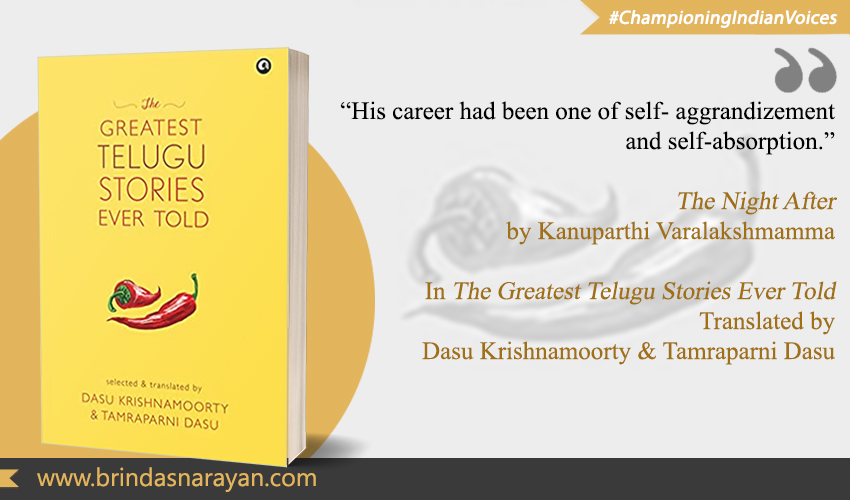
Reading Telugu Stories: A Deputy Collector Regrets His Working Life
The Author’s Backdrop
The Telugu author, Varalakshmamma, was born in 1896 in Andhra Pradesh. She was a zealous member of the freedom movement, who was galvanized by Mahatma Gandhi. More impressively, she was a feminist who urged other women to assert their rights and to join Gandhi’s movement, a message that must have been significantly radical in the era she inhabited.
The Night After
In her story, The Night After, Rajeswara Rao, a deputy collector, starts ruing the life he had lived on the eve of his retirement. Through his career, he had been seduced by the trappings of power, treating subordinates and servants with arrogance. He hadn’t exhibited compassion even once. His working life flashes past him – as a series of images. All he can recall are his own coldness and ruthlessness.
Remorse At Death
The tale also serves as a metaphor for death. Some reports of near death experiences aver that life flashes by, at that point, like a series of postcards. At the end, what matters less are the titles you flaunt or the possessions gained. What matters most, even to yourself, is how you have lived. Often, however, as the author reinforces, people arrive at this realization a little too late.
Averting Retirement
Penned with wit and humor, the narration indicates that Varalakshmamma observed life, and all its accompanying absurdities, with uncommon levity. Though Rajeswara Rao lived in a quieter age, he was privy to the same, ludicrous desires that we contemporaries exhibit. Intent on warding off his retirement by any means, he attempts at the last minute, to revive his youthful looks: “On the eve of his retirement, deputy collector Rajeswara Rao moved heaven and earth to win a two-year extension – he even dyed his hair and filled the gaps in his teeth with partial dentures.”
How Power Distorts The Brain
More fascinatingly, the story also centers around the manner in which power can distort brains. An article in The Psychology Today describes the various ways in which power can affect all, including those who would like to see themselves as being progressive or sensitized. The controversial 1971 Stanford prison experiment led by Philip Zimbardo revealed that participants who wore guard uniforms even for a short period, became more aggressive and ruthless than they were in everyday life.
Other experiments depict that those occupying higher status misread or stop mirroring the emotions experienced by those in low status. In other words, power seems to shut down certain regions of the brain, perhaps even to enable the occasional dispassion or toughness required of leaders. To some extent, this might be necessary. After all, over-empathizing can lead to paralyzing dysfunction.
The problem, as depicted in The Night After, is when power completely shuts one off from the tribulations of people unlike oneself. And even makes you helpless or strangely vulnerable because of your growing dependence on others: “Once Rajeswara Rao began climbing up the ladder, he never had to exert himself in any way, even to pick up a handkerchief that had dropped to the ground.”
When Life Seesaws
Suffused with philosophical underpinnings, of the manner in which life ricochets between joy and sorrow, the story reminds us to occupy healthier middle grounds. When elated, we cannot forget that we might soon face the opposite. At certain times, like the protagonist in the story, we face a deluge of hardships. Just when Rao’s income was going to drop and his material standards fall, his right hand was paralyzed. His health was declining at a stage when he would no longer have staff to support him.
Bereft of the obeisant servants and yes-men that circulated him earlier, at the end he wakes up to a humid room. The manually-operated fan no longer whirs. He’s hot and uncomfortable. That’s when the thought strikes him: “Why should I rue the loss of this comfort when millions of people sleep without a fan every day? That thought brought tears to his eyes.” It’s the eventual flickering of empathy, a new feeling aroused by his overnight powerlessness.
Why We Need Stories
In her article, “The Brain Under The Influence of Power,” Marwa Azab writes: “New leaders should be trained on how to disambiguate power from true leadership.” Reading literature or listening to stories could be one of the means.
References
The Greatest Telugu Stories Ever Told, Selected and Translated by Dasu Krishnamoorty and Tamraparni Dasu, Aleph Book Company, 2022
https://www.scientificamerican.com/article/what-near-death-experiences-reveal-about-the-brain/
Marwa Azab, “The Brain Under The Influence of Power,” Psychology Today, June 9, 2020.




